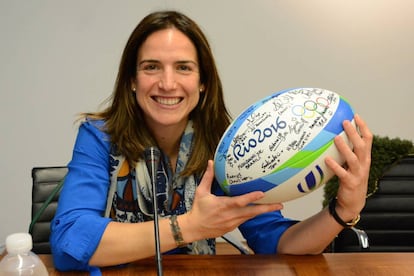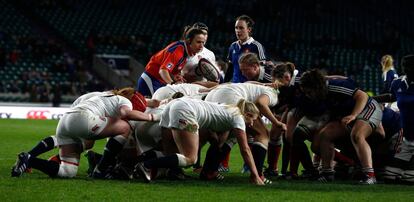Alhambra Nievas: The female referee proving rugby is not just a man’s game
The Spaniard is blazing a trail for women in the sport, becoming the first woman to be the main ref in an international men’s rugby test match

The first woman to be the main referee in an international men’s rugby test match, taking charge of the Women’s Rugby Sevens Final at the 2016 Rio Olympics, being crowned World Rugby referee later that year… Spaniard Alhambra Nievas is taking a traditionally male-dominated game by storm.
The award-winning rugby referee from Granada became the first woman to officiate in a men’s international fixture last November, marking the latest accomplishment on her record-breaking CV.
My mom gave me my name out of nostalgia – and because she’s passionate about Granada and the Alhambra
In a testament to her name – which her mother gave to her out of love for Granada’s Alhambra Palace, established during Spain’s Moorish dynasty – Nievas heralds a new dynasty for women, not only in the niche, close-knit refereeing world of rugby, but also in sport itself.
“My mom gave me my name out of nostalgia – and because she’s passionate about Granada and the Alhambra. I sometimes feel as if it weighs a responsibility upon me, or a type of personality. It’s special and beautiful – I like it.”
The 34-year-old’s story is illuminating – even more so in a country that once witnessed Oscar-winning actor Javier Bardem – who briefly played for the national under-21s team – state that being a rugby player in Spain is like being a bullfighter in Japan.
The latter might still be a rarity, but Nievas has seen the wind of change blowing strongly in her country, where the 11-man, two-footed game is worshiped by many.
“My grandad watches a lot of soccer, he loves soccer,” she explains. “The first time he watched a rugby match, when I was refereeing on TV, he was shocked. He said to me, ‘Wow…the players didn’t give you any stick – just respect! You looked like you had everything under control!’

“Now he brags about rugby to his friends in his pueblo, telling them that it is a very noble sport, that there’s respect and no machismo. He might be old, but by watching it on TV he’s already picked up the spirit.”
Nievas discovered the sport at 19, when she was in her second year at Malaga University. The engineering student had never heard of rugby before, but became hooked after a contact session on tackling. Her mother protested that the sport ate in to her valuable studying time, and, after seeing her occasional black eyes and blows to the face, asked her to give it up.
But Nievas persevered – and her parents came around, flying out with her brother to Ireland for a week while she officiated at the Women’s Rugby World Cup last August, where she was joined by Las Leonas – Spain’s women’s rugby team – in their first ever showing at the tournament.
Nievas had her own first months later in an otherwise normal rugby match played in front of a 250-strong crowd in a rainy Helsinki, when she was thrust into the spotlight after refereeing Finland’s 15-8 victory over Norway.
Could she ever referee a game between two top-ten male sides? Or in the men’s Six Nations?
“The media were all around the game,” Nievas says. “I did a lot of interviews and I had a high-profile – I just had to accept it. But it was just another match – I did the usual preparation, followed the same protocol on the day. Of course it was special because of its significance, but it was just a normal game.”
In a country where women were once shackled to the home and largely discouraged from partaking in sport or political life, Nievas is already inspiring the next crop of female referees, and through several other initiatives she is helping young girls to dream big.
But how far, though, can Nievas actually go? Could she ever referee a game between two top-ten male sides? Or in the men’s Six Nations? There are, of course, physical limitations to what a woman’s body can deal with compared to a man’s: the fitness tests and concentration levels needed at the top level are very demanding. I ask her if she sees a glass ceiling, one she is yet to smash.
“A lot of people ask me if I’ve got a ceiling,” she says, adding that she never sets herself unrealistic goals, because they just end up being frustrating. “I always say this – my objective is to enjoy what I’m doing and continue to learn, improve and enjoy it.”
And for anyone who sees her on the pitch, that’s something that is clear to see.
Tu suscripción se está usando en otro dispositivo
¿Quieres añadir otro usuario a tu suscripción?
Si continúas leyendo en este dispositivo, no se podrá leer en el otro.
FlechaTu suscripción se está usando en otro dispositivo y solo puedes acceder a EL PAÍS desde un dispositivo a la vez.
Si quieres compartir tu cuenta, cambia tu suscripción a la modalidad Premium, así podrás añadir otro usuario. Cada uno accederá con su propia cuenta de email, lo que os permitirá personalizar vuestra experiencia en EL PAÍS.
¿Tienes una suscripción de empresa? Accede aquí para contratar más cuentas.
En el caso de no saber quién está usando tu cuenta, te recomendamos cambiar tu contraseña aquí.
Si decides continuar compartiendo tu cuenta, este mensaje se mostrará en tu dispositivo y en el de la otra persona que está usando tu cuenta de forma indefinida, afectando a tu experiencia de lectura. Puedes consultar aquí los términos y condiciones de la suscripción digital.








































